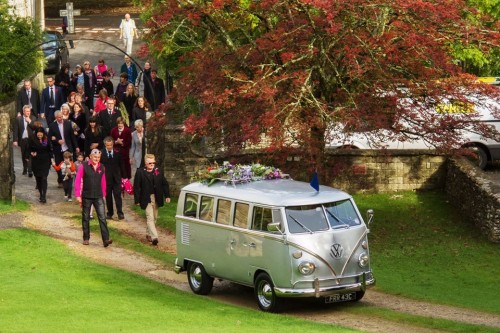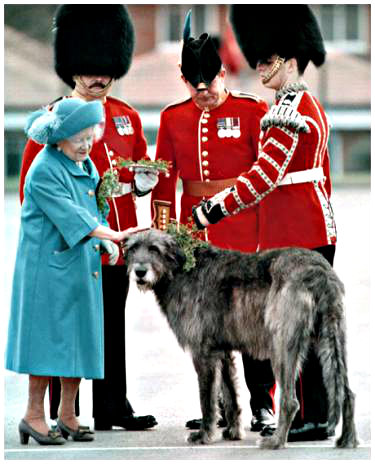Funeral in Gloucestershire Oct 2014 – Photo Noel Baker, hearse Volkswagen Funerals, undertaker Fred Stevens
When Lawrence Llewelyn Bowen was at large on tv’s Changing Rooms, it was not unusual for people to weep when they saw what he’d done to their living room and, through their tears, defiantly declare that, first chance they got, they were going go out and buy 5 litres of brilliant white.
Not all, mind. Some loved the opulence and the clutter.
The same tension between magnificence and minimalism has been evident throughout the history of the British funeral. The time of greatest opulence was between 1400 and 1700, the golden age of the heraldic funeral, supervised by the College of Arms and reserved, of course, for armigerous people, ordinary folk being of no account in those days, not having Russell Brand to speak up for them. The period of greatest minimalism was during the Protectorate, when the Directory of Public Worship (1644) ordained:
When any person departeth this life, let the dead body, upon the day of burial, be decently attended from the house to the place appointed for public burial, and there be immediately interred, without any ceremony.
Cromwell’s own funeral was exceedingly grandiose.
The Puritan funeral has only been surpassed in simplicity by that minimalist newcomer, direct disposal.
The educated and the posh know that the first rule of good taste is restraint. Their fastidiousness is not endorsed by most so-called ‘ordinary people’, who love to put on a good show and, afterwards, festoon a grave with garish, joyous grieving bling. The East End funeral is a good example, the sort of occasion that Bertram Puckle had in mind in his 1926 bestseller, Funeral Customs, Their Origin And Development:
The procession conducting the body to the grave has always offered a welcomed opportunity for the display of pomp, circumstance and ostentatious grief, so prized by the vulgar mind. The average man or woman can claim public attention only at marriage and burial, and on each of these occasions a nonentity becomes the centre of attraction in a ceremonial procession to and from the church.
Not sure if he means the undertaker, the chief griever or the corpse.
We all love a bit of pomp and ceremony even if, for some people (liberals, lefties, intellectual snobs) admitting it is like fessing up that their favourite film is the Sound of Music. Strong men and women of all worldviews have wept at the spectacle of the doggy mascot of the Irish Guards. I know; I am one of them.
And that’s why I deplore the decline of the ‘traditional’ funeral for people who wish, in the spirit of the Irish Guards, to put on the dog for their funerals, but are presently declining to do so either because we, as a culture, are going through another bout of minimalism or, as seems more likely, they are not getting value from our trad, ceremonial funeral. It’s not doing them enough good to justify the expense.
Before we consider the elements of the ceremonial funeral and ask ourselves what we want to keep and what we can repurpose, let’s make sure we understand one thing above all. The modern ceremonial funeral is modelled on the Victorian funeral. And it doesn’t stop there, because the Victorian funeral was a chivalric revival of the medieval heraldic funeral. Our trad funeral has its origins in chapter one of our island story. Are we really going to stand stony-eyed and watch all that go down the pan?
The obsession with the one-off, bespoke, personalised funeral fails to take into account all those who like funerals whose format is a comfortingly familiar and recognisable and which contains a well-written, well-delivered, highly personal eulogy.
Here, then, are some generic elements of ceremonial. Which would you junk and which would keep?
1. Public
2. Processional
3. Eyecatching (ie, presents a visual spectacle)
4. Hierarchical
5. Creates a fitting sense of occasion
6. Comprises symbolic, non-verbal acts
7. Ritualistic, operating according to arbitrary or arcane rules
8. Incorporating visual, tactile, olfactory, kinetic, auditory and gustatory (food) elements
9. Participative
10. Of minimal utilitarian value
Next, which of the following statements do you agree or disagree with?
1. Funerary ceremonial is a means of preserving historic attitudes and conduct – ‘this is what we think and this is what we do when someone dies’. To reject socially sanctioned ceremonial is not an expression of autonomy, it is an anti-social act.
2. Ceremonial confers legitimacy – ‘if we did not do it this way it would be inauthentic’.
3. Tradition – ie faith in the authority of immemorial beliefs and institutions – is the path to truth – ‘I will only be able to handle this and make sense of it if I stick to the ritual.’ Desired consequences ensue if you do the ritual right.
4. Rejection or absence of ceremonial typifies a culture where institutions and collective beliefs are weak. Tradition dies when social conditions and/or belief systems alter and traditional responses are seen to produce an adverse reaction.
5. A familiar ritual is a means of dealing with something we do not fully understand. We meet the event with such wisdom as we have already assimilated from previous experiences of the ritual
6. A processional funeral is a vehicle which takes you from one mental/emotional state to another. “A good funeral gets the dead where they need to go and the living where they need to be.” – Thomas Lynch
7. Ritual is the best means of bringing people together
“A good funeral is not static. The first great necessity of death is to move the body of the deceased from here to there, that is, from the place of death to the place of final disposition. In most places around the world, and throughout most of human history, carrying the body of the deceased to the grave or the fire or the mountain, weeping or singing, mourning and praying along the way, is not done before the funeral or after the funeral – it is the funeral.” Thomas Long



![biker_funeral[1]](https://www.goodfuneralguide.co.uk/wp-content/uploads/2014/10/biker_funeral1-500x274.jpg)

What an excellent article, Charles. Thank you. Personally I agree with all of the statements, all of which are true at some times and for some people. Of the elements the only one I would consistently dispose of in all cases is that it should be of minimal utility. As I have opined before, funerals have many functions. A good funeral is one that fulfils its function, whatever that may be. Like it or not we live in a relativist culture where one size most certainly does not fit all. The only things in my opinion which an FD must… Read more »
Are we standing stony-eyed and watching the ceremonial funeral go down the pan? Are we obsessed with one-off bespoke funerals? My grandparents’ funerals were traditional and very forgettable. Are you referring to the rise in direct cremations? They’re not for me. However, there have been occasions where the person in the coffin was so hated that I wished he or she had been taken direct to the cremator. In my experience, people are making funerals their own but they’re not abandoning the ceremonial side – yes it’s a different kind of ceremony in some cases but I’ve never felt that… Read more »
That’s a very interesting and characteristically bracing point you make, A Celeb. I assume you reject ‘comforting familiarity’ as ‘forgettable’ and claim that people have no difficulty in embracing bespoke ceremony. It would be good to have someone from the traditional wing make a case for ‘the authority of immemorial beliefs and institutions’. After all, most people do not go to watch the Changing of the Guard in the hope of seeing a novel take on the ceremony, nor would the majority welcome Danny Boyle’s makeover of a state funeral. I could be wrong, of course, but having been attacked… Read more »
Time. It’s the enemy of the alternative funeral. That said, only last week two good friends, (still in the prime of life middle sixties) told me that they wanted a conversation with me regarding their own arrangements.
It’s a start, but I feel unless we all talk about our funeral wishes and choices, mostly things will stay the same. Bring them out in to the light, and I am certain the funeral as we know it will perish. I do hope so, we deserve better, YOU deserve better.
By that I mean that most funerals are still distress purchases, hurriedly arranged within hours of death.
Families these days are making contact first, rather than simply calling the first firm they think of – but they often just have a quick ring around a few local undertakers and (in my experience) end up asking for a quote for a standard spec funeral, the crem fee, Doctor’s and Minster’s fees. If they just slowed down a little, they could actually plan a much better one.
I agree Charles, familiarity is comforting. Which is probably why I cannot think of a single bespoke funeral that didn’t have several elements of ‘tradition’. A few decades ago, who would ever have imagined that we would have a popstar singing at the funeral of the mother of our future King in Westminster Abbey? Her funeral was traditional, ceremonial, bespoke and very memorable. Yes, I want to have my cake and eat it too!
I think bespoke “alternative” funerals are now the new normal, but “tradition” isn’t all lost. As I have said many times before, I love undertaking “traditional” and military funerals because of my military background but it doesn’t mean that we can’t or won’t arrange something bespoke and we certainly wouldn’t talk someone out of a woodland burial. People are quite happy to tell you what they want these days….even down to what they want you to wear on the funeral. They also feel more able to have a ring round to get prices but also to speak to the funeral… Read more »
Here’s a personal experience: I had a relative who led a long, full and varied life and her activities touched a great many people. In short a eulogy writer would not have been scrambling around for material, but she left clear instructions that she wished for a plain service with the Order for the Burial of the Dead read from the Book of Common Prayer by a Clerk in Holy Orders, and no more. No hymns, no funeral sermon, no eulogies. Her funeral was attended by people who had known her and received benefits from her work and I spoke… Read more »
Good article and before reading the comments I was thinking at last something on gfg which is not fighting tradition!! Thank you. My business model does not depend on what is called traditional. It depends on people being willing to pay me to help and do for them as they wish at their time of loss. It is not unusual for gfg to suggest that traditional funerals are provided as the fd’s choice to the detriment of the client. That families time after time choose Abide with me, death is nothing at all and I did it my way tells… Read more »
Each to their own but I do have misgivings about the idea that families have a direct cremation and then at some later date plan to have a memorial ceremony. I’m wondering if that ceremony is sometimes quietly forgotten as everyone gets on with their lives. And if the memorial ceremony is arranged, is it as well attended as the funeral would have been?
Valid points. There must be time and space to mourn and remember, however modestly.
[…] https://www.goodfuneralguide.co.uk/2014/10/tradition-guide-jailer/ […]